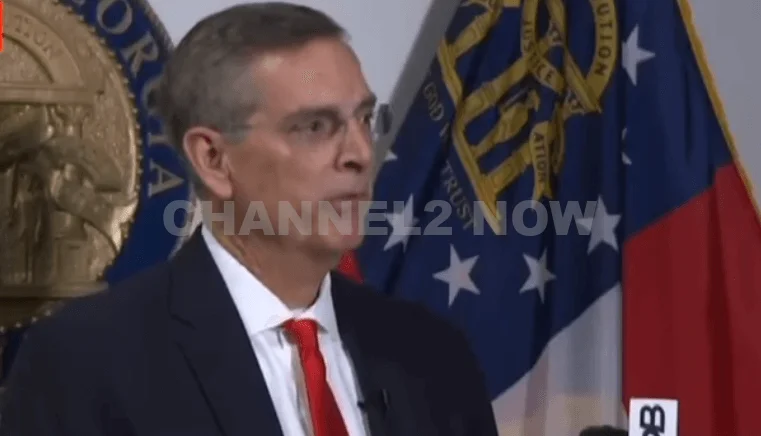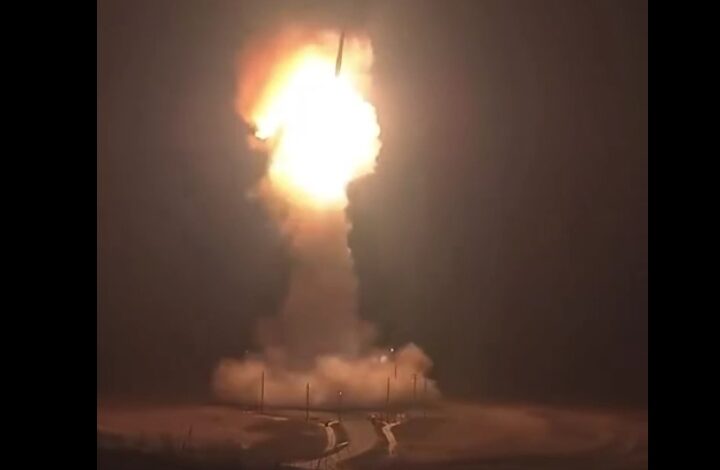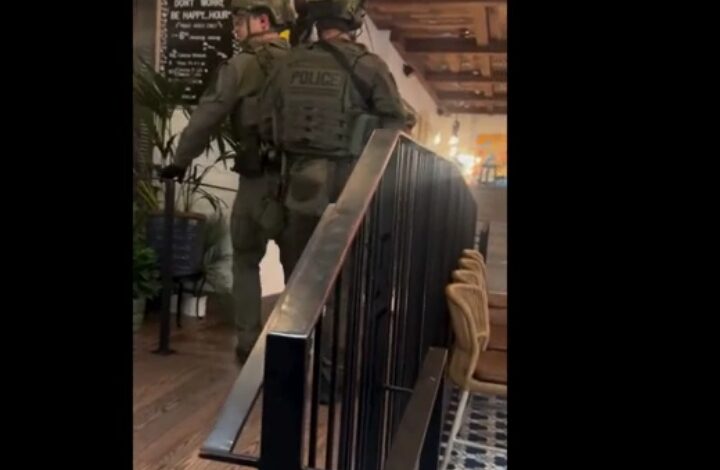
Georgia Polling Locations Targeted in Foreign-Linked Bomb Threats from Russian Email Domains on Election Day; Brief Evacuations Triggered at Key Sites in Fulton County as Officials Move to Extend Voting Hours Amid Heightened Security and Claims of Foreign Interference
Georgia Polling Locations Targeted in Foreign-Linked Bomb Threats from Russian Email Domains on Election Day; Brief Evacuations Triggered at Key Sites in Fulton County as Officials Move to Extend Voting Hours Amid Heightened Security and Claims of Foreign Interference
In a disturbing development on Election Day, bomb threats were sent to multiple polling locations across the state of Georgia, prompting temporary evacuations at two key sites in Fulton County. The threats, traced back to Russian email domains, have raised concerns of foreign interference in the U.S. electoral process, sparking national conversations about the vulnerability of democratic institutions to cyber-based intimidation tactics. Georgia’s state officials are responding swiftly to reassure voters of their safety and reaffirm their commitment to ensuring that every Georgian can exercise their right to vote without intimidation or delay.
Timeline of Events
The bomb threats emerged early on the morning of November 5, 2024, targeting a total of five polling stations in Georgia. Authorities first received alerts from Etris Community Center and Gullatt Elementary School, both located in Union City, a suburb of Atlanta in Fulton County. These sites were temporarily evacuated as law enforcement conducted thorough sweeps. Both facilities reopened approximately 30 minutes later after officials determined there was no credible threat. Three other polling locations that also received threats were able to continue operations without requiring evacuation.
In response, local law enforcement, the Fulton County Police Department, and federal agencies including the FBI mobilized to secure all polling stations in Fulton County. Fulton County Police issued a statement confirming that while no active threats were discovered, officers would maintain a visible presence across all 177 polling locations to safeguard the integrity and security of the election process.
Immediate Reactions from Officials
At a press conference later that morning, Georgia Secretary of State Brad Raffensperger addressed the public to confirm that the origin of the threats had been traced to Russian email domains. “This is yet another example of foreign actors trying to disrupt our democratic process,” Raffensperger stated, underscoring the need for vigilance against such forms of interference. “They don’t want us to have a smooth, fair, and accurate election.”
Raffensperger condemned these actions as attempts to sow division and fear among U.S. citizens. “The threats aim to instill a sense of chaos and to shake our confidence in the integrity of the electoral process,” he said. The Secretary of State expressed gratitude for the swift response of law enforcement agencies and reassured voters that their right to a fair election would be protected.
To mitigate any disruption to voting access, the Fulton County Department of Registration & Elections announced plans to seek a court order extending voting hours at the affected locations for the same amount of time they were closed. This measure, they explained, would help ensure that any voter inconvenienced by the evacuations would have the opportunity to cast their ballot without time constraints.
Heightened Security Measures at Polling Locations
As the bomb threats circulated, the Fulton County Police Department and other law enforcement agencies rapidly implemented security enhancements. Officials confirmed that a comprehensive security plan had been activated, involving a significant increase in the presence of law enforcement officers, plainclothes agents, and other emergency responders at polling stations. In addition to physical security, cyber units were mobilized to monitor for any digital threats or further foreign-linked disruptions to the voting infrastructure.
A spokesperson for the Fulton County Police explained that these precautions are designed not only to maintain public safety but also to assure voters of their right to participate in the election process. “Voters will see officers at all 177 polling places today,” read a department statement. “This presence is meant to ensure a safe and supportive environment for everyone casting their vote.”
Federal agencies, including the Department of Homeland Security (DHS) and the Cybersecurity and Infrastructure Security Agency (CISA), have been coordinating with local officials in Georgia to provide additional support, both in person and through cyber surveillance. CISA Director Jen Easterly issued a statement expressing confidence in the resilience of U.S. election infrastructure against such intimidation tactics. She emphasized that all agencies involved would “work tirelessly” to protect election integrity from any form of interference.
Investigative Efforts and Russian Link
While the threats have been traced back to Russian email domains, officials have cautioned that this connection alone does not confirm direct involvement by the Russian government. Intelligence analysts are working to determine whether the individuals or groups behind these threats have any formal affiliation with state-sponsored efforts or if they represent independent actors aiming to destabilize the U.S. election process.
Experts in cyber espionage and election security have noted that Russian cyber actors have long demonstrated a capability and willingness to interfere in foreign elections. Since the 2016 U.S. presidential election, which involved well-documented Russian disinformation campaigns, intelligence agencies have been on high alert for similar tactics. The Kremlin, however, has repeatedly denied any involvement in such activities. Russia’s Foreign Ministry issued a statement dismissing the allegations of interference in Georgia’s election, calling them “groundless” and “politically motivated.”
Broader Context: Foreign Influence and Election Security
This latest incident is not an isolated case but part of a broader pattern of foreign attempts to influence U.S. elections and democratic processes. Over recent years, foreign actors, particularly those linked to Russian, Chinese, and Iranian sources, have increasingly targeted U.S. elections through a mix of disinformation, hacking, and intimidation tactics.
Russian-linked actors have reportedly deployed disinformation campaigns aimed at eroding trust in the electoral process. These campaigns have targeted U.S. voters on social media, exploiting divisions and disseminating false information to polarize the electorate further. U.S. intelligence agencies believe that foreign actors, including Russia, view American elections as an opportunity to destabilize the nation’s political environment and diminish its influence on the world stage.
Additionally, cybersecurity experts have observed an uptick in cyberattacks targeting U.S. infrastructure, including electoral systems. Although these attacks have not compromised voting systems directly, they have increased the burden on local officials to safeguard their systems and prepare for potential disruptions. The FBI and CISA have been actively working with states to bolster election security, providing resources and training on preventing cyber intrusions and ensuring that voting systems are secure.
Impacts on Georgia’s Voters and Election Integrity
The bomb threats briefly impacted voting operations, yet officials are confident that they will not have a lasting effect on voter turnout or the integrity of the election results. Union City voters affected by the evacuations expressed both frustration and relief. “It was scary, but I appreciate the fast action from the police. We were able to get back to voting pretty quickly,” said Maria Gutierrez, a voter at Gullatt Elementary School.
To mitigate concerns, Georgia’s election officials have emphasized the importance of resilience in the face of such disruptions. “Our democracy depends on the strength and commitment of our citizens to uphold it, even when faced with intimidation,” Raffensperger stated. “Today, voters showed that commitment by coming out to vote despite attempts to deter them.”
Steps to Ensure Future Election Security
In the wake of this incident, election officials and lawmakers are advocating for additional security measures and resources for future elections. Recommendations include increased federal funding for election security, enhanced training for local election staff on responding to physical and cyber threats, and further development of secure communication channels to quickly disseminate information during an emergency.
Senator Jon Ossoff (D-GA) commented on the need for resilience in election security at a press conference. “We must recognize that foreign actors will continue to test the boundaries of our democratic processes. Our response must be strong, and our safeguards must be unbreakable,” Ossoff stated. He called for renewed federal support to address election security concerns and prevent foreign threats from undermining U.S. elections.
In response, a bipartisan group of lawmakers has drafted a proposal to establish a nationwide “Election Security Fund” aimed at helping states implement advanced protective measures. This fund would allocate resources for improving cybersecurity, increasing physical security at polling locations, and developing rapid response teams to address any incidents that may arise.
Lessons from International Experiences with Election Interference
While the United States has garnered the most attention for foreign election interference, it is not alone in facing these challenges. In recent years, countries like Georgia, Moldova, and Ukraine have reported similar tactics aimed at destabilizing their electoral systems. In Moldova’s 2021 presidential election, a series of cyberattacks targeting voter databases was attributed to Russian sources, echoing patterns observed in the U.S.
These incidents highlight the need for international cooperation on election security. Organizations like NATO and the European Union have been actively working with member states to develop defense mechanisms against cyber and disinformation threats. Some experts have proposed a global coalition to combat election interference, potentially under the United Nations’ auspices, to establish universal standards and share resources among democratic nations.
Conclusion
The bomb threats targeting Georgia’s polling stations underscore the persistent vulnerability of democratic institutions to foreign interference and the growing need for robust countermeasures. While the evacuation of polling sites was brief and no credible threat materialized, the incident served as a reminder of the lengths to which foreign actors may go to disrupt the democratic process. By responding quickly and transparently, Georgia’s officials have reaffirmed their commitment to upholding electoral integrity and ensuring that citizens can vote without fear.
As the day progresses, officials continue to monitor security at polling locations across the state. Local and federal agencies have expressed their determination to uphold the election’s integrity and maintain public confidence in the electoral process. Moving forward, this incident is expected to fuel further discussion about national security, election interference, and the resilience of democratic systems in the face of unprecedented challenges.



